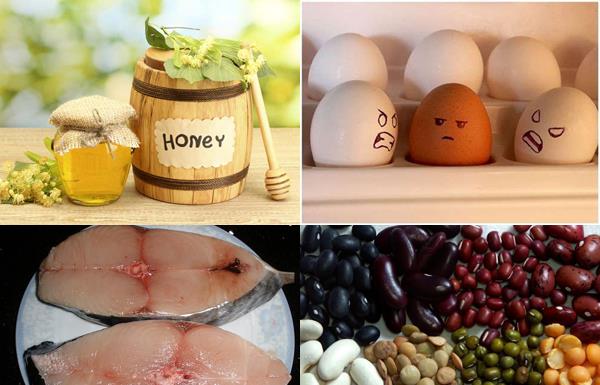Children under 1 year old are in the stage of formation and development, so the organs in the body are quite immature. Therefore, there are foods that mothers absolutely cannot touch. Salt, honey, egg whites, what's more? Find out with MarryBaby
Salt
Salt is very important for the human body, helping to ensure the organs in the body work properly. However, for children under 1 year old, salt is one of the "taboo" okay!
For young children, the amount of salt the body needs each day is usually very little and the baby's daily foods such as milk, fruit, meat, fish ... have enough salt needed. Therefore, it is completely unnecessary to give your baby salt or add salt to his food . It could even harm you.
Street
Like salt, one year old babies' sugar requirements are often supplemented through foods every day. So, putting sugar into your food is a bit… redundant! In addition, there are also quite a few studies proving the link between giving children a lot of sweets at an early age and the habit of eating a lot of sugar and carbohydrates later. Moreover, foods containing a lot of sugar will cause bad effects on your child's newly emerging teeth , you should be careful!

These foods can be dangerous to your baby!
Honey
Honey contains a lot of nutrients and vitamins that are good for the body. However, for the baby's immature digestive system, honey becomes a formidable "poison". In honey contains clostridium botulinum spores, which cause botulism poisoning. For adults, these spores are completely harmless because the digestive system has "matured" enough to neutralize these spores. Meanwhile, the children's digestive system is still not strong enough to do this.
Egg
Eggs are a food that causes allergies for children, especially egg whites. In babies under 6 years of age, eating egg whites can lead to hives, eczema and other ailments. Ideally, mothers should only feed their children egg whites when babies are 1 year old to avoid allergies. In addition, if you feed your baby egg yolks, don't forget to cook them well before feeding them.
Fresh milk
In raw milk there are many vitamins and minerals, especially the protein content of fresh milk is even twice as high as breast milk. However, because of this, fresh milk is completely not suitable for babies under 1 year old. The reason is that the baby's immature digestive system at this time is unable to metabolize protein, causing the baby's kidneys and stomach to be "overloaded". Not only that, the rather meager content of vitamin C and iron in fresh milk is not enough to provide the daily needs of babies under 1 year old. So, if you intend to give your baby a drink of fresh milk, maybe you should "leave" for a while longer.

When should let children drink fresh milk? Many people think that fresh milk has absolutely no nutrients at all and does not provide enough nutrients for your baby. Actually, fresh milk also contains many vitamins and minerals that are not inferior to powdered milk. However, there are a few small notes that mothers need to pay attention to when trying to feed their babies fresh milk. Join in ...
Small fruits and seeds
Grapes and nuts all have a high nutritional profile, but with their small size, they easily cause babies to suffocate when eating. When feeding grapes, mothers should cut them very small to avoid the risk of choking. For nuts and seeds, mothers can puree them into powder for babies to eat.
Fish with a high mercury content
Some types such as mackerel (large type), shark, swordfish ... have a high mercury content in fish meat. And mercury will damage the baby's young brain and nervous system. Although there is no official report on the level of damage caused by mercury, most scientists recommend that children should not be fed these types of fish.













